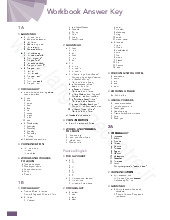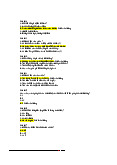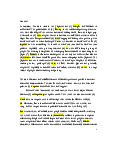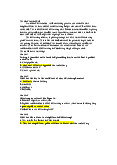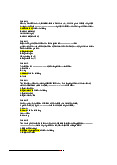






Preview text:
Name ____________________________ Class ____________________________ Progress Test Files 7–12
Grammar, Vocabulary, and Pronunciation A GRAMMAR
1 Complete the sentences. Use the correct form of the verb in brackets.
Example:If I had (have) a lot of money, I’d buy a new car.
1 I __________ (know) Lisa for ten years. We’re good friends.
2 We __________ (live) in a big house in the country, but now we have a city flat.
3 What would you do if you __________ (lose) your wallet?
4 A I didn’t really like that film.
B Neither __________ (do) I!
5 If you really wanted that coat, you __________ (save) your money to buy it.
6 Jean-Pierre asked us if we __________ (want) to go out for a pizza.
7 A How long __________ (you / be) in the swimming team? B Since last summer.
8 A I __________(not go) to the party tonight. B Neither are we.
9 Pasta comes from Italy, but now it __________ (make) all over the world.
10 A Why are you going out?
B __________ (post) this letter.
11 Gus was there at the time of the robbery, but he said he __________ (not see) anything.
12 If they __________ (get) here before 7pm, we’ll go and see that film.
13 The teacher told us __________ (stay) after class.
14 We got to the theatre twenty minutes late, and the play__________ (already / start).
15 Our school __________ (build) in 1968. 15
2 Underline the correct word or phrase.
Example: When did you finish / have you finished your work?
1 You don’t have to / mustn’t pay to enter the museum. It’s free.
2 If you don’t tidy your room, your things will / would get lost.
3 I get on well with my brother / my brother well.
4 A I love salsa dancing.
B Neither / So does my sister.
5 We really enjoy / want spending time at the beach.
6 The meeting will / might finish early. It depends how long the boss speaks!
7 You don’t have to / shouldn’t listen to him. He tells lies.
8 I borrowed my sister’s laptop, because mine / my was broken.
9 Was / Did he use to teach history at your school?
10 They’ve lived in this flat for / since 18 months.
11 It’s easier to learn / learn a language when you’re young.
12 Who left / did leave all this washing up last night?
13 Is Dominic good at playing / play the piano?
14 I might see / to see that film this weekend.
15 What have you eaten / did you eat for dinner last night? 15 1
Name ____________________________ Class ____________________________ Progress Test Files 7–12
Grammar, Vocabulary, and Pronunciation A
3 Complete the sentences with one word.
Example: The boy ran into the street to catch his ball.
1 Ted said he __________ already heard this album.
2 This play was written __________ William Shakespeare.
3 Oh no! I’ve __________ to feed the dog!
4 The hours in my job are long, but I don’t __________ working late, so that’s okay.
5 A Is this book __________, Lucia?
B Yes, it is. Thanks. It was a birthday present.
6 He hasn’t seen his cousins __________ last year.
7 You _______ smoke in this building. It’s against the law.
8 Her class is in room 12 on the first floor. Go __________ the stairs and turn left.
9 __________ you pay that man, he’ll sell you the tickets you need.
10 A __________ there use to be a cinema in the town centre?
B Yes, but it closed six months ago. 10 Grammar total 40 VOCABULARY
4 Underline the odd word(s) out.
Example: duck eagle swan mosquito
1 divorced retired married tired
2 put on take off turn down try on
3 maths physics chemistry biology 4 towards passed through along 5 lose miss catch get on 6 spider cow horse pig
7 get an email get home get a present get a salary 8 crocodile shark dolphin goat 9 a bit really quite good
10 get up go away sit down look after 10 5 Write the opposite.
Example: turn on (the TV) turn off 1 get up (in the morning) __________ 2 stand up __________ 3 forget (a name) __________ 4 put on (a coat) __________ 5 turn up (the radio) __________ 5 2
Name ____________________________ Class ____________________________ Progress Test Files 7–12
Grammar, Vocabulary, and Pronunciation A
6 Complete the sentences with the correct word(s).
Example: Would you like to look at my holiday photos? watch look at read
1 I used to play a lot of tennis, but I gave it __________ last year, and now I play basketball. down off up
2 Nina is really afraid __________ spiders. on of by
3 My uncle decided to __________ at the age of 50 and go travelling. retire receive repair
4 Go __________ the museum and the cinema is on your left. over past along
5 When I saw them they were walking __________ the park. on away across
6 Email was __________ in the 1970s, but most of us first used it a lot later. discovered invented designed
7 If you don’t know how to get there, look __________ the directions on the internet. down through up
8 My great-grandmother married young, and __________ ten children. had got became
9 I’m looking __________ my neighbour’s cats while he’s on holiday. after forward for
10 I __________ broke my friend’s iPod. luckily accidentally finally
11 My aunt always __________ a handbag. wears puts carries
12 Ben doesn’t look ___________ his father. They’re completely different. like as same
13 I’m really tired, and I don’t feel __________ going out tonight. for like to
14 The snake moved __________ , and everyone felt very frightened. luckily sadly suddenly
15 A I don’t like early mornings at all. B __________ do I! So Also Neither 15
7 Complete the sentences with one word.
Example: I woke up very early this morning.
1 Please __________ your dictionaries to the next class.
2 Frank doesn’t __________ much money. His job is badly paid.
3 A Sorry this is taking a long time.
B That’s OK. I __________ mind waiting.
4 Leo __________ on very well with Alex. They’re good friends.
5 I __________ last night listening to my favourite songs.
6 Our teacher __________ us we had all passed our exams. 3
Name ____________________________ Class ____________________________ Progress Test Files 7–12
Grammar, Vocabulary, and Pronunciation A
7 The boy __________ that he wanted to travel before university.
8 Keith’s in the shower right now. He’ll call you __________ in twenty minutes.
9 Clare got a __________ for her birthday, and now she’s having riding lessons.
10 Don’t __________ away that old newspaper. I haven’t read it yet. 10 Vocabulary total 40 PRONUNCIATION
8 Underline the stressed syllable. Example: a|ddress 1 dol|phin 2 e|lec|tion 3 in|ven|ted 4 se|pa|ra|ted 5 e|le|phant 6 su|ccess 7 to|wards 8 news|pa|per 9 i|ma|gi|na|tion 10 di|rec|ted 10
9 Match the words with the same sound.
tiger send finish get turn discover wear enj f
oy orget hope divorced
Example: remember send 1 elephant _______ 2 throw _______ 3 across _______ 4 pretend _______ 5 whale _______ 6 promise _______ 7 dangerous _______ 8 earn _______ 9 mosquito _______ 10 try _______ 10 Pronunciation total 20
Grammar, Vocabulary, and Pronunciation total 100 4
Name ____________________________ Class ____________________________ Progress Test Files 7–12 Reading and Writing A READING
1 Read the article and tick ( ) A, B, or C.
Is technology bad for our brains? by James Sanders
Nowadays, many useful gadgets (small machines) are advertised as ‘smart’. This
‘smartness’ generally means that the machine can change how it works to suit the
user’s needs, learn our preferences, and make intelligent choices for us.
Smartphones can now take photos, play songs, send emails, and do a thousand
other useful things, such as shopping online or assisting us with our homework. We
used to need lots of machines to help us to do these things, but not any more. They
fit in our pockets, but contain more data than we could ever possibly need, or remember.
If you asked most people, they would say that smart machines have improved life.
Not everyone agrees, however. A few scientists are worried about the effect of using
machines to do things that we used to do for ourselves. For example, we don’t have
to remember people’s contact details any more, as our phones store this
information. We can also find information instantly, via internet search engines like
Google. A few studies have shown, surprisingly, that people in their 50s and 60s are
better than teenagers at studying and memorizing information, because they’ve always worked this way.
Technology has changed our expectations and made us very impatient. Now we
want our news in tiny soundbites, and get bored if we actually have to read or listen
for more than a minute or two. Scientists reported recently that the internet was
changing how we think and learn. One author even said that Google was making us
stupid! It’s certainly true that we often do two or three things simultaneously when
we are online, and it’s harder and harder to focus on one thing. Maybe technology is
bad for our brains, and our memories, and we should stop depending on it all the
time. But if you tell me to give up my smartphone, sorry, I won’t!
Example: Gadgets nowadays can be very useful. A True B False C Doesn’t say
1 ‘Smart’ gadgets work differently for different users.
A True B False C Doesn’t say
2 Gadgets can do more things now than in the past.
A True B False C Doesn’t say
3 Most people don’t have many machines any more.
A True B False C Doesn’t say
4 Most people think that ‘smart’ technology is bad for us.
A True B False C Doesn’t say
5 Younger people depend too much on ‘smart’ technology.
A True B False C Doesn’t say
6 Teenagers are always better than older people at remembering information. 5
Name ____________________________ Class ____________________________ Progress Test Files 7–12 Reading and Writing A
A True B False C Doesn’t say
7 We are less happy to wait for things than we used to be.
A True B False C Doesn’t say
8 Using the internet changes young people’s brains more than older people’s.
A True B False C Doesn’t say
9 We find it more difficult to concentrate on one thing than we used to.
A True B False C Doesn’t say
10 James Sanders wants to stop using modern gadgets.
A True B False C Doesn’t say 10
2 Match five of the highlighted words / phrases with the definitions.
Example: be right for something, or someone suit
1 look at, or think about __________ 2 without waiting __________ 3 keep __________ 4 result of something __________ 5 information __________ 5 Reading total 15 6
Name ____________________________ Class ____________________________ Progress Test Files 7–12 Listening and Speaking A LISTENING
1 Listen to Kate speaking about a job she enjoys. Tick ( ) A, B, or C. 1 Kate usually works _____. A in an office B at her house C at a swimming pool 2 She teaches _____.
A one day a week B three days a week C all week
3 She most enjoys teaching _____. A the youngest children B competition swimmers C older people 4 Most of the adults are_____. A afraid of the water B good swimmers C about 50 years old
5 Kate says that she doesn’t earn much _____ in her part-time job. A hours B money C times with her students 5
2 Listen to five conversations. Match them with situations A–E. Conversation 1 Conversation 2 Conversation 3 Conversation 4 Conversation 5 A giving some news B getting directions C visiting the doctor D leaving a phone message E buying some medicine 5 Listening total 10 7
